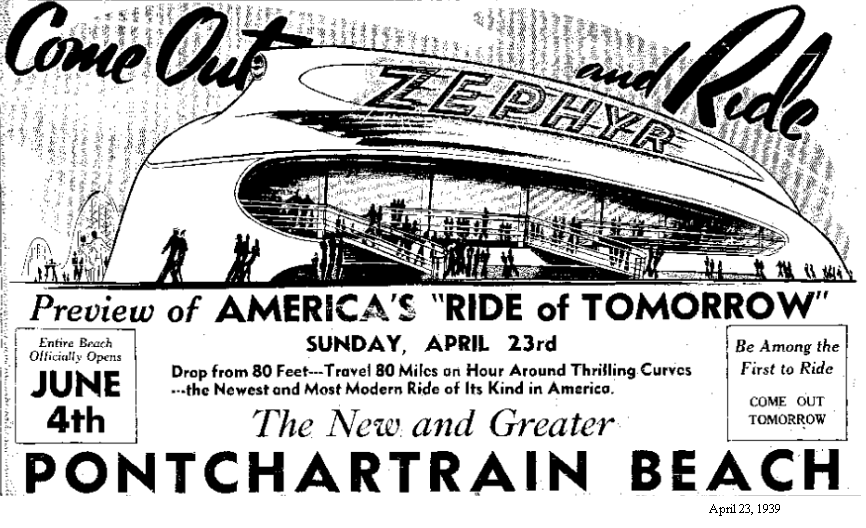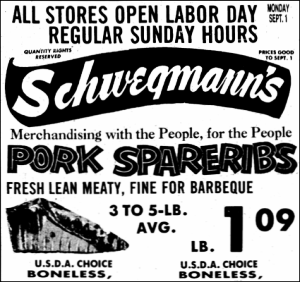
Jazzland Opens
May 20, 2000
According to the New Orleans Public Library (
see HUD SECTION “108" LOAN GUARANTEE PROJECTS),
"The City of New Orleans received $25,3000,000.00 in gap financing from the HUD Section 108 Loan Guarantee Program.
Groundbreaking was July, 1998 and the park opened May 20, 2000. The Jazzland Theme Park is an entertainment retail, and amusement
complex. The park features a variety of entertainment opportunities designed to convey the elements of New Orleans’
rich culture and history. The majority of the jobs created will be available for low to moderate income persons. In addition
to the economic benefits mentioned Jazzland Theme Park will assist the City in achieving its goal of diversifying the image
of New Orleans as an “adult tourist” City into more of a “family tourist” destination. Jazzland had
1 million visitors in the first year of operation".
Jazzland was operated by Alfa Smartparks (later Odgen Entertainment and now known as Palace Entertainment
but owned by a Spanish company called Parques Reunidos). Rides included the Mega Zeph, a wooden roller coaster track built
on a steel frame to prevent termite infestation and withstand hurricane force winds. The Mega Zeph was inspired by the old
Zephyr roller coaster at the closed Pontchartrain Beach. The original intent was to rebuild the Zephyr but it was a smaller
roller coaster so that idea was scrapped in favor of the current larger Mega Zeph. Other rides included a junior steel coaster
called Rex's Rail Runner, a wild mouse steel coaster, and a common steel shuttle looping Vekoma boomerang rollercoaster called
a Zydeco Scream. The park had a Log Flume and a Splashwater falls ride called Spillway Splashout. In addition, the park
had common amusement park spinning rides and a Carousel Merry Go-Round. The park was not profitable, as Alpha Smart Parks
specialized in running water parks and smaller amusement arcade centers. In 2001, the lease was put up for sale and in March
2002, Six Flags purchased the lease. The park was run in 2002 as Jazzland.
In early 2003, Six Flags upgraded the park and renamed it Six Flags New Orleans. The park added
more shaded areas, as well as many new flat spinning rides, and re-branded the park to the Six Flags. The "It's
playtime!" theme included a dancing old man, Mr. Six. Batman: The Ride (an inverted looping B & M coaster) was added
and another multiple looping coaster, The Jester, was brought from Six Flags Fiesta Texas.
A water park was in the planning stages in early 2005, scheduled for opening at the end of August,
when Hurricane Katrina struck. The last day the park operated was August 21, 2005. The park grounds were surrounded by a
6-foot earthen flood berm which retained flood water after the park's drainage pumps failed during the storm. The entire
park grounds were submerged in corrosive brackish floodwater to a depth of 4 to 7 feet for over a month. Due to the
extensive water and wind damage, the park was closed indefinitely.
On July 1, 2006, having previously announced that the park would be closed "at least" through 2007",
Six Flags announced that they had concluded their damage assessments and declared the park to be an "effective total
loss"—with no desire or intent by the company to undertake the prohibitive cost of rebuilding—and was in
negotiations with the City of New Orleans to make an early exit from the 75-year lease which Six Flags entered into on the
property in 2002. However, then-Mayor Ray Nagin said he planned to hold Six Flags to the lease agreement and force them
to rebuild. If held to the terms of the lease agreement, Six Flags would have been legally obligated to rebuild the park
on the same site, but only to the extent of the insurance money Six Flags received. Six Flags never returned.
Several redevelopment proposals have been submitted by various
interests (including Southern Star Amusement Inc. (2008–2011), Jazzland Paidia Company (2011), and Jazzland Outlet Mall
(2011–2013) but none have materialized. The park has been abandoned. (WIKI)
You Can Support this Site by Clicking on & Shopping from this Amazon Link -- and it
won't cost you a penny more:


The 2006 mayoral race was one of the most expensive in New Orleans history.
At the time of this election, at least two-thirds of its residents were still displaced. One candidate said in his Times
Picayune interview he was running because the city's demographics had dramatically changed. There were three unsuccessful lawsuits filed to prevent delaying the original
election date. The state first performed a voter purge and then set up a complicated voting process that required most
displaced voters to travel back home. In addition, elaborate absentee voting procedures were required to included multiple
mailings, notarizing documents and extensive verifications. An April 1 protest march in the city called for satellite voting
to give displaced voters the same rights as those who had returned. In the April 22 election, Nagin was the front runner
with 38% of the vote. Louisiana Lieutenant Governor Mitch Landrieu came in second with 29%. Nagin and Landrieu faced each
other in a run-off election on May 20, 2006. Nagin defeated Landrieu 52% to 48%. (WIKI)
Photo -- Director Alan J. Pakula, Julia Roberts, Producer Pieter Jan Brugge, Mayor Sidney J. Barthelemy, and Mickey Barthelemy
at a Gallier Hall press conference,
May 20, 1993. The actress and her colleagues were in New Orleans filming
The Pelican Brief. Photographer unknown. (NOPL)
Born in Washington, La., John Milliken Parker served as Governor from 1920 to 1924. Career Prior to this
he was President of the Cotton Exchange and the New Orleans Board of Trade. Parker died on
May 20, 1939 in
Pass Christian, Misssissippi and is emtombed in Metairie Cemetery. Source:
http://www.sec.state.la.us/57.htm
Joséphine Charles, religious co-founder, and superior general of the Sisters of the Holy Family.
Born, New Orleans, 1812; daughter of a German named Haus and a black woman; in 1843, joined Henriette Delille (q.v.) and
Juliette Gaudin (q.v.) to found a religious community of Negro nuns; the community came to be known as the Sisters of the
Holy Family; the sisters were dedicated to the care of needy members of their race by the establishment of schools, orphan
asylums, and homes for the sick and aged; was superior general of the order, 1867-1882, although she became totally blind
in 1880. Died, May 20, 1885. Source: http://lahistory.org/site20.php
George Foster Shepley was appointed acting Mayor of New Orleans in May 1862. His administration as
Mayor lasted only one month and a few days -- from May 20-July 11, 1862. He subsequently was appointed
Military Governor of Louisiana. When the war between the States broke out, he acted as Commander of a brigade in General
Butler’s expedition and later commanded one of the first brigades that entered New Orleans. (NOPL)
Lafayette Cemetery No. 1 was established in 1833 by the Council of the City of Lafayette in the square
bounded by Prytania St., Washington Ave., Sixth St., and Plaquemine (now Coliseum) St. By 1847 the cemetery on Prytania
appears to have been reaching capacity, and in October, the Council resolved that there be no new burials in the original
cemetery. It is unclear just when the city did purchase the land for the new burial ground, in the square bounded by present-day
Sixth, Loyola, Washington, and Saratoga streets, but on May 20, 1851, the Council ordered the new cemetery
(Lafayette No. 2) divided into three sections as the old cemetery had been divided. (NOPL)
The First Municipality Council, by ordinance of May 20, 1840, provided for the appointment
of two attorneys, a principal Attorney and a second Attorney. The principal or first attorney had the control and management
of all claims that the municipality felt compelled to prosecute by judicial proceedings. He was to furnish to the Council
monthly a report on the suits instituted and their progress. (NOPL)









